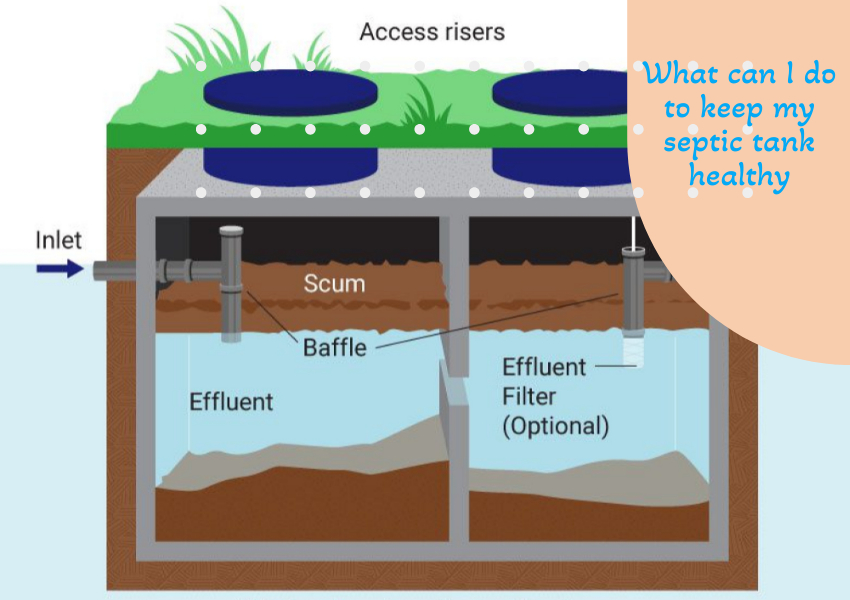Your septic tank is an important part of your home’s plumbing system, and it’s important to keep it well-maintained. Septic tank maintenance helps to prevent backups, overflows, and environmental damage.
Why is septic tank maintenance important?
Septic tanks are responsible for treating wastewater from your home. This wastewater contains bacteria and other harmful substances that can contaminate the environment. Septic tank maintenance helps to break down these substances and prevent them from polluting the environment.
In addition, septic tank maintenance helps to keep your septic tank operating efficiently. A well-maintained septic tank will last many years, while a poorly-maintained septic tank may need replacement prematurely.
How often should I have my septic tank serviced?
The frequency at which you need to have your septic tank serviced will depend on the size of your septic tank and the number of people living in your home. You should have your septic tank pumped every 3-5 years.
However, if you have a large septic tank or a lot of people living in your home, you may need to have your septic tank pumped more often. You should also have your septic tank inspected annually by a professional septic tank service.
What can I do to keep my septic tank healthy?

There are many things you can do to keep your septic tank healthy, including:
- Avoid putting grease, oil, or fat down the drain. These substances can clog your septic tank and prevent it from functioning properly.
- Use water-efficient appliances and fixtures. This will help reduce the wastewater your septic tank has to treat.
- Keep your septic tank clean and free of debris. You can do this by regularly pumping your septic tank and inspecting it annually.
- Avoid using harsh chemicals in your home. These chemicals can damage your septic tank and prevent it from functioning properly.
Also read: Best Septic Leach Field Cleaner
What are the signs of a septic tank problem?
Many signs may indicate that you have a septic tank problem, including:
- Slow drains
- Sewage backups
- Sewage odors
- Lush green grass over your septic tank
- Standing water around your septic tank
If you experience any of these signs, you should contact a professional septic tank service immediately.
How to troubleshoot septic tank problems
If you are experiencing a septic tank problem, you can try to troubleshoot the problem yourself. However, it is important to note that septic tank problems can be complex, and it is best to contact a professional septic tank service if you are not comfortable troubleshooting the problem yourself.
Here are a few tips for troubleshooting septic tank problems:
- Check the drain field for any pooling water or lush green grass. If you see any of these signs, it may indicate that your drain field is clogged.
- Check the septic tank for any leaks. If you see any leaks, you should contact a professional septic tank service immediately.
- Check the septic tank effluent filter for any clogs. If the effluent filter is clogged, you can clean it yourself or contact a professional septic tank service to clean it for you.
- If you have tried all of the above and are still experiencing a septic tank problem, you should contact a professional service.
FAQs
How often should I have my septic tank pumped?
In general, you should have your septic tank pumped every 3-5 years. However, the frequency at which you need to have your septic tank pumped will depend on the size of your septic tank and the number of people living in your home. If you have a large septic tank or a lot of people living in your home, you may need to have your septic tank pumped more often.
What are the signs of a septic tank problem?
Some of the signs of a septic tank problem include:
Slow drains
Sewage backups
Sewage odors
Lush green grass over your septic tank
Standing water around your septic tank
If you experience any of these signs, you should contact a professional septic tank service immediately.
How can I prevent septic tank problems?
There are some things you can do to prevent septic tank problems, including:
Avoid putting grease, oil, or fat down the drain.
Use water-efficient appliances and fixtures.
Keep your septic tank clean and free of debris.
Avoid using harsh chemicals in your home.
What should I do if I have a septic tank problem?
If you have a septic tank problem, you should contact a professional septic tank service immediately. Septic tank problems can be complex and dangerous, so it is best to leave them to the professionals.
How much does septic tank maintenance cost?
The cost of septic tank maintenance will vary depending on the size of your septic tank, the frequency at which you need to have it pumped, and the location of your home. However, you can expect to pay anywhere from $200 to $500 for a septic tank pumping.
Conclusion
Septic tank maintenance is important for keeping your septic tank operating efficiently and preventing environmental damage. By following the tips in this guide, you can keep your septic tank healthy and avoid septic tank problems.






